Graham Reid | | 4 min read
Miles Davis: Splatch
.jpg)
Depending on when he was talking and
the mood he was in, Miles Davis would claim to have changed the
direction of music three – or four – times. No one would doubt
the impact of Birth of the Cool, Kind of Blue and Bitches Brew –
which might make the “three”.
But the fourth?
Although it didn't change the course of
music as he might have wanted to believe, there is a case that his
controversial '86 album Tutu changed his own direction, albeit rather
briefly. It certainly was one in the eye for George Butler at his
longtime label CBS because . . .
Maybe Butler, the head honcho at CBS
Records – as Sony used to be -- regretted making that phone call to
Miles Davis. Then again, maybe he didn't.
When Butler rang Davis in the mid Eighties and suggested Davis phone their hot new signing, jazz trumpeter Wynton
Marsalis, to wish him happy birthday, Davis was furious. They'd
already delayed releasing his Time After Time album and wouldn't pay
for a tribute album so Davis had had to dig into his own money from
an endowment . . . and now this insult.
Ring the guy who was replicating Davis'
former style and saying derogatory things about his new music?
“I knew right then I had to get away
from those [Oedipal cussword] at CBS. That was the only way they
could get some publicity for Wynton,” he told me in '88.
So Davis quit his record company of 30
years – to whom he had delivered milestone albums such as Porgy and
Bess (in 1958), Kind of Blue ('59), Sketches of Spain ('60), In a
Silent Way ('69) and Bitches Brew ('70) – and moved on.
In truth though, Butler may not have
been unhappy to see him go. Davis' street-funk and rock-influenced
albums of the Seventies – On the Corner, Get Up With It, Star
People, You're Under Arrest – and his most recent live set We Want
Miles (with guitarist Mike Stern grabbing space) hadn't set useful
sales figures. They'd also alienated Davis' jazz following without
bringing in the funk and rock crowd.
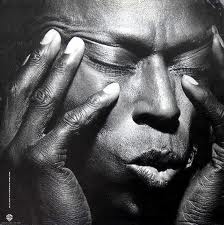 And Davis was never easy. He'd been
scathing about Marsalis, plagued with drug problems again and at any
opportunity would point out the racism he saw in the music industry.
And Davis was never easy. He'd been
scathing about Marsalis, plagued with drug problems again and at any
opportunity would point out the racism he saw in the music industry.
Which might be why his first album for
his new company Warners was Tutu, after Archbishop Desmond Tutu of
South Africa. And why headed in another new direction.
It was the centre of the
synth-splattered Eighties – the previous years had seen Prince's
Purple Rain, Madonna's Like a Virgin and the rise of bands like
Wham!, Tears for Fears and Scritti Politti – and Davis was keen to
work with Prince.
But, as with his plan to work with
Hendrix just before the guitarist's death, things fell through. So he
hooked up with bassist/multi-instrumentalist Marcus Miller who had
spent much of his career as a sideman (briefly with Davis), session
player and arranger.
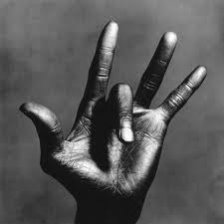 Miller was the guiding hand behind
Tutu. Of the eight tracks he wrote all but two (one a co-write with
Davis) – the others were George Duke's Backyard Ritual and Scritti
Politti's Perfect Way. He also co-produced it with Tommy LiPuma (who
had signed Davis to Warners with some trepidation).
Miller was the guiding hand behind
Tutu. Of the eight tracks he wrote all but two (one a co-write with
Davis) – the others were George Duke's Backyard Ritual and Scritti
Politti's Perfect Way. He also co-produced it with Tommy LiPuma (who
had signed Davis to Warners with some trepidation).
Miller handled most of the instruments
– synths, sequencers and drum machines which gave a staccato feel
to the r'n'b funk – and when the album was released many critics
savaged it saying Davis had been hijacked by Miller's synth-funk
sound.
As if Davis could be made to do
anything he didn't want to do?
Tutu – in striking cover photos by
Irving Penn -- stands as a late career high for Davis who immersed
himself in the bed of synth sounds and also, although this was often
overlooked at the time, played some fine solo work throughout. He was
tight and pointed, never flashy and always working within the service
of beats and grooves.
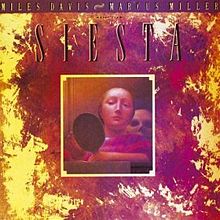 He worked again with Miller on the
soundtrack to the film Siesta the following year – a sort of lesser
version of a synth-funk Sketches of Spain if you can imagine that –
but by this time Davis was just doing one-off projects (the
inevitable hip-hop album wasn't to far off) so Tutu was to be his
last innovative hurrah.
He worked again with Miller on the
soundtrack to the film Siesta the following year – a sort of lesser
version of a synth-funk Sketches of Spain if you can imagine that –
but by this time Davis was just doing one-off projects (the
inevitable hip-hop album wasn't to far off) so Tutu was to be his
last innovative hurrah.
But it didn't change the direction of
music.
Tutu is now re-presented in a
remastered 25th anniversary edition with an extra disc of a concert
in Nice that year with a brittle funk-rock band – which includes
saxophonist Bob Berg, guitarist Robben Ford and two synth players –
stretching out on older material (Jack Johnson), pieces from Tutu
(Portia, Splatch) and contemporary pop hits Human Nature (Michael
Jackson) and Time After Time (Cyndi Lauper).
Those who found Tutu a step too far
from jazz won't warm to the extra disc which is often more akin to
rock – like We Want Miles with a synth-funk edge – than even the
constrained playing on Tutu.
But Tutu was a fine late-period Davis album and open ears at the time accepted it as Davis pushing in a new direction, and some of its critics found themselves warming to it over time.
Within a year it was being hailed as Davis' comeback album
and scored him another Grammy, for best jazz instrumental performance.
It also became one of Davis' biggest
selling albums.
You wonder if he called George over at
CBS to tell him.


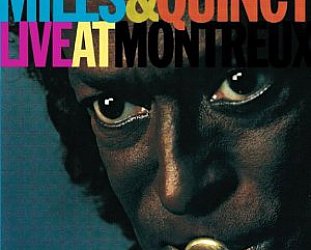
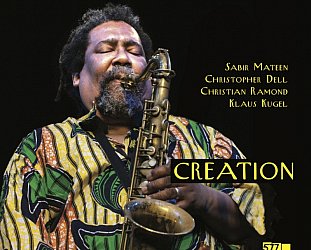

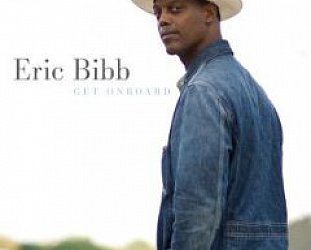

post a comment